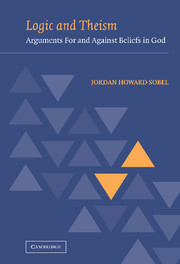Book contents
- Frontmatter
- Contents
- Preface
- DIVINITY
- ARGUMENTS FOR THE EXISTENCE OF GOD
- ON TWO PARTS OF THE COMMON CONCEPTION
- ARGUMENTS AGAINST THE EXISTENCE OF GOD
- XI Atheologies, Demonstrative and Evidential
- XII The Logical Problem of Evil
- PRACTICAL ARGUMENTS FOR AND AGAINST THEISTIC BELIEFS
- Notes
- References
- Index of Names
XII - The Logical Problem of Evil
Published online by Cambridge University Press: 28 July 2009
- Frontmatter
- Contents
- Preface
- DIVINITY
- ARGUMENTS FOR THE EXISTENCE OF GOD
- ON TWO PARTS OF THE COMMON CONCEPTION
- ARGUMENTS AGAINST THE EXISTENCE OF GOD
- XI Atheologies, Demonstrative and Evidential
- XII The Logical Problem of Evil
- PRACTICAL ARGUMENTS FOR AND AGAINST THEISTIC BELIEFS
- Notes
- References
- Index of Names
Summary
Philo:Epicurus' old questions are yet unanswered. Is he willing to prevent evil, but not able? then is he impotent. Is he able, but not willing? then is he malevolent. Is he both able and willing? whence then is evil?
(Hume 1991 Part 10, p. 157)The problem of evil ‘proper’ is the prima facie logical incompatibility of the existence of a perfect being – a being who would be omnipotent, omniscient, and perfectly good inter alia – and evil. Other problems challenge perfect-being theism with plausible contingencies other than its bare existence, evidence for which is observed, for example, that this is not the best of all possible worlds. I count all of the original problem of these other problems as problems of evil and identify ‘the problem of evil’ with the family of them. In this chapter arguments in a series of this family are considered, starting with ‘Epicurus’ old questions' made into the Argument from Evil, proceeding to the Argument from the World's Not Being a Best World, next to the Argument from the World's Not Being a Best Divinely Creatable World, after that to the Argument from Not Being a Best Divine Bet World, then to the Argument from There Being a Better World Than This One, and finally to a rearrangement of that argument into a Dilemmatic Argument that rearranges the previous one under the disjunction, either there is a best possible world or there is not.
- Type
- Chapter
- Information
- Logic and TheismArguments for and against Beliefs in God, pp. 436 - 496Publisher: Cambridge University PressPrint publication year: 2003

